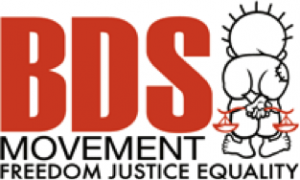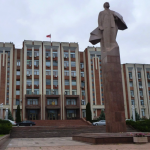BDS, or Boycott, Divestment and Sanctions, aimed towards Israel, is not a new movement. It first started in 2005 and was created by Palestinian activists. However, in the last few months it has really started to gain some momentum. Its goal is to put economic pressure on Israel until, according to the movement’s website, “it complies with international law and Palestinian rights”. The BDS movement has a lot of similarities with the Anti-Apartheid Movement (AMM) in South Africa. The AMM started with international boycotts in an attempt to end the South African system of apartheid where a minority white population had the political and social control over the majority black population.

BDS pressure comes with the boycotting of products that are produced on Palestinian land occupied by Israel or of companies that somehow support Israel in their occupation. Disinvestments would seek the withdrawal of pension funds and investment portfolios’ money from Israeli ventures involved in constructing settlements. Finally, sanctions would come from diplomatic and economic forums of which Israel is a party, such as military alliances and labor unions. According to the Palestinian BDS National Committee (BNC), who organises the whole strategy behind this movement, these different tactics would eventually put so much economic and political pressure towards Israel that it would reconsider its position and attitude regarding Palestine and seek a peace agreement.
Unfortunately, if someone mentions movements like BDS or other campaigns that openly criticise Israel, he or she can be accused of anti-Semitism, which discourages such serious discussions. But countries should be condemned when they occupy land that doesn’t belong to them, divert water supply from communities or restrict the free movement of a whole population. The peculiarity with Israel is that it wants to be recognised as a Jewish state, intrinsically linking religion and a sovereign state. In doing so, any attack on Israel’s actions as a country is soon viewed as an attack against the Jewish religion. Applying the same principle, criticism of the United States’ action would be minimised for fear that it would be seen as anti-Christian (although the US has a separation between religion and State, it has a strong Christian identity). Therefore, the situation described above, gives Israel the perfect defensive tool but doesn’t change the fact that as a State it has to answer for its actions.
That being said, for those who condemn the BDS movement, anti-Semitism is the preferred weapon. These opponents claim the real objective of the movement is the destruction of the state of Israel and that the goals defined by the movement, some like the end of colonisation of occupied Palestinian land or the return of Palestine’s refugees, would make Israel completely unviable as a country. Furthermore, opponents to the movement point out that even Palestinian Authority’s President Mahmoud Abbas rejects the BDS movement stating, “it is not in the Palestinians’ favour.” The president would be in favour of boycotting products from occupied land but not Israel, since he recognises Israel as a country.
On the supporting side of the movement, the main argument is the comparison of BDS with the Anti-Apartheid Movement against the white minority in South Africa. Supporters make the correlation between both movements and try to remind society that the AAM movement also received the same kind of criticism when it started yet it was ultimately responsible for the end of the oppression of the black majority in the African country. Supporters see both movements as peaceful protests against what they believe to be injustices. They also believe that attacking Israel economically is more efficient and just than launching rockets.
However, the main reason why BDS supporters believe it is a legitimate tool is that it has already had some remarkable victories, which are even recognised by Israel. According to Yair Lapid, Israel’s Finance Minister, Israel is starting to feel the consequences of the movement in its economy. Furthermore, as the movement gains popularity, it could reach a tipping point where Israel’s business owners may start pressuring for a peace agreement between both states. Even US Secretary of State John Kerry warned that Israel would suffer if its leaders failed to reach a peace agreement with the Palestinians.
Indeed, the BDS movement is hurting Israel’s economy. PGGM, a large Dutch pension fund, has liquidated its holdings in five Israeli banks. Denmark’s largest bank, Danske Bank, has blacklisted Israeli Bank Hapoalim, because it finances the construction of illegal settlements in the occupied Palestinian territories in the West Bank. The  boycott of Israeli products has also been effective. Agrexco, Israel’s former largest exporter of agricultural produce, entered liquidation after its products were boycotted in European supermarkets. Even some western brands were targeted, like the sports brand New Balance for its sponsor of the Jerusalem Marathon. A full list of alleged achievements of the BDS movement can be found here.
boycott of Israeli products has also been effective. Agrexco, Israel’s former largest exporter of agricultural produce, entered liquidation after its products were boycotted in European supermarkets. Even some western brands were targeted, like the sports brand New Balance for its sponsor of the Jerusalem Marathon. A full list of alleged achievements of the BDS movement can be found here.
It’s not the first time that Israel has suffered pressure from the outside world. In the 1960’s, a French arms ban against Israel led the country to develop its own military industrial complex which is one of the most modern and active in the world today. Arab countries have been boycotting Israel for decades without much success. However, this time there seems to be a difference. The BDS movement is growing stronger and is gaining mainstream success in Europe, one of Israel’s biggest economic partners. Additionally, in the prime time of the Internet and social media, movements just need a small spark to go viral and turn into a world youth fever against Israel, which at the same time can bring the dangers of the anti-Semitism sentiments. Whatever the destiny of the BDS movement, whether it is just another cry out against Israel or a tide turner like the AMM in South Africa, it is already serving its purpose, shining light onto the unsolved Israeli-Palestine conflict.
By Rodrigo de Souza
Image Credit:
Picture 1 & 2: BDS Movement










